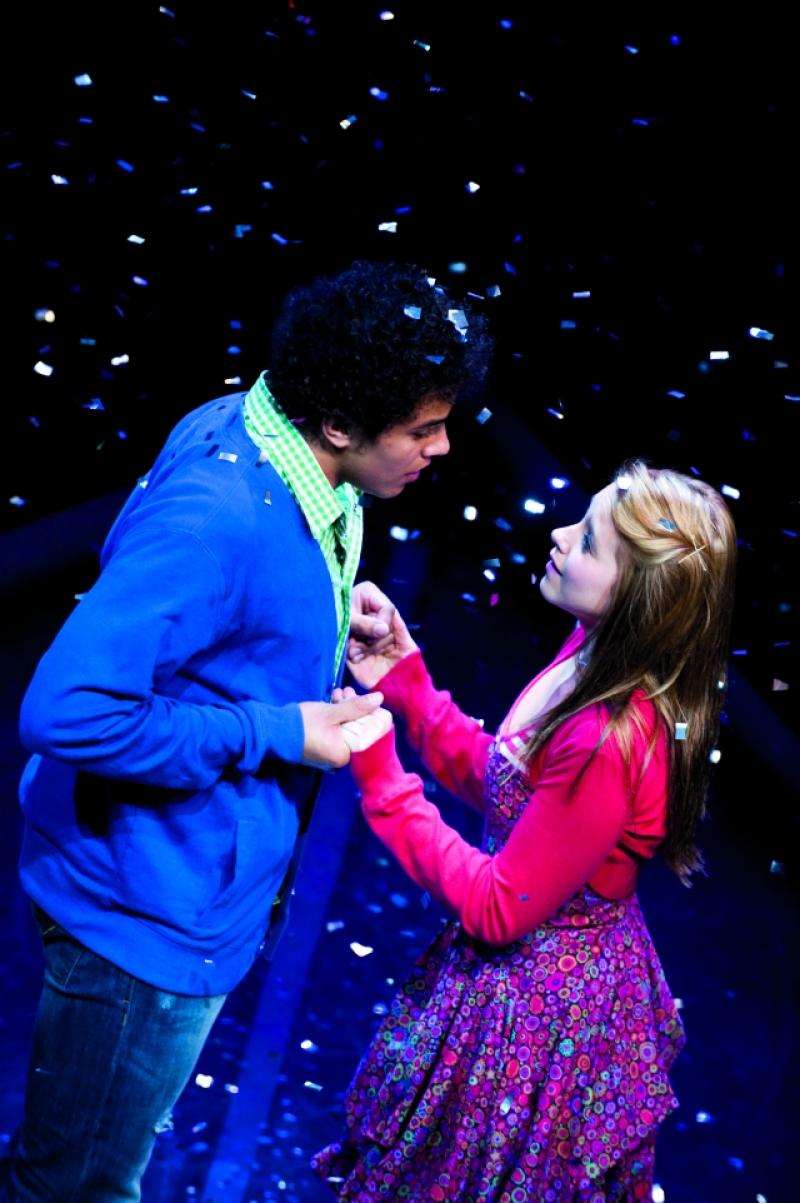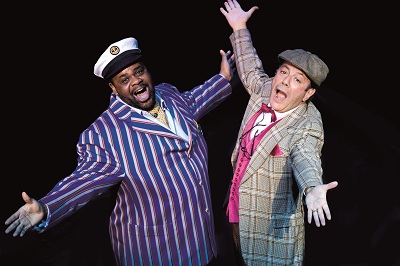The Fantasticks, Duchess Theatre | reviews, news & interviews
The Fantasticks, Duchess Theatre
The Fantasticks, Duchess Theatre
Small and simple Off Broadway, winsome and wearying on the West End

Just when you thought it was safe to go back to the musical theatre (Paradise Found, anyone?), along comes The Fantasticks, and we are returned to square one.
Part of the problem, I suspect, rests with material that doesn't really benefit from a "production", which is to say, from any approach beyond the deliberately rough-and-ready, homespun feel that the show has always had in New York. (It's worth noting that this musical never got anywhere near a Broadway house, and rightly so.) A product of a burgeoning Off Broadway that at the time was in gathering thrall to the avant-garde, The Fantasticks is rooted in commedia dell'arte, Beckettian vaudeville, and meta-theatre even as the tale it tells is banal in the extreme. Tart the piece up too much and it cracks under the weight; keep it relatively simple, as director Amon Miyamoto has here, and you risk a crippling self-consciousness.
Miyamato, by all accounts, staged an acclaimed version of this very show in his native Japan, but I can't say that his West End incarnation shows any intuitive feel whatsoever for its highly peculiar demands. Rumi Matsui's platform set, for starters, is basic yet gloomy and lends an air of the funereal before events have even begun. Only at the very end is there a Chagall-like splash of colour that comes entirely out of the blue (well, yellow, actually), the odd neon strip of Rick Fisher's lighting on hand to evoke, however fleetingly, a gondola amidst an environment that for the most part is distressingly drab.
None of this would matter if the performers generated their own sparks, but that is not the case. No doubt unsure how to pitch a tale of young love that devolves in the second act into a creepy variant on The Phantom of the Opera, the performers range from the winsome (Lorna Want as the lovestruck Luisa) to the underpowered (David Burt as one of the young lovebirds' two fathers) to wildly hammy and OTT - that last, the redoubtable Edward Petherbridge, here wasted in the part of an ageing, fruity thesp given over to mangling passages of Shakespeare. Small wonder a character described only as The Mute (Carl Au) looks on in disbelief. Clive Rowe (pictured right, with David Burt) lends a stentorian vigour to the part of the other father; between them the two men erect a wall so as to keep apart the very lovebirds that then learn more about life than they - or we - could have wished for come the second act. Playing El Gallo, our guide into the piece and the character that gets the show's defining number, "Try To Remember", Hadley Fraser vacillates between crisp, even plummy oratory and some sort of strange approximation of Zorro - perhaps forgetting that the masked man's own musical departed the West End some while ago. "Round and Round" is the number that most directly posits El Gallo as a Phantom of sorts to the enquiring Luisa's would-be Christine, with the difference that the lair underlying the Paris Opera turns out here to be a tree - oops, make that "tree", given the artifice in which The Fantasticks traffics so avidly. (The moon, we're informed, is "plastic, phony, hollow".)
Clive Rowe (pictured right, with David Burt) lends a stentorian vigour to the part of the other father; between them the two men erect a wall so as to keep apart the very lovebirds that then learn more about life than they - or we - could have wished for come the second act. Playing El Gallo, our guide into the piece and the character that gets the show's defining number, "Try To Remember", Hadley Fraser vacillates between crisp, even plummy oratory and some sort of strange approximation of Zorro - perhaps forgetting that the masked man's own musical departed the West End some while ago. "Round and Round" is the number that most directly posits El Gallo as a Phantom of sorts to the enquiring Luisa's would-be Christine, with the difference that the lair underlying the Paris Opera turns out here to be a tree - oops, make that "tree", given the artifice in which The Fantasticks traffics so avidly. (The moon, we're informed, is "plastic, phony, hollow".)
That's the paradox of The Fantasticks, which on the one hand celebrates theatrical fakery while wanting on the other to gladden our hearts with a genuinely sweet score, many numbers from which are well known to American playgoers of a certain generation, myself absolutely among them. (I've always had a soft spot for "Plant a Radish", which offers a paean to the vegetable kingdom that you don't find in, say, Dirty Dancing.)
But I'm afraid you can't force charm any more than you can make much that is meaningful out of this musical's parable of life. ("The world happened to me," concludes Luke Brady's Matt, Luisa's intended, by way of explaining the mess that takes him over late in the show.) At the end, The Mute appears yet again, continuing to deluge all and sundry with stardust and confetti and heaven knows what else. Isn't it hard to sing when you've got stuff swirling around you? Not that The Mute would know. As might be guessed from his name, the chap keeps his mouth shut throughout.
Share this article
The future of Arts Journalism
You can stop theartsdesk.com closing!
We urgently need financing to survive. Our fundraising drive has thus far raised £49,000 but we need to reach £100,000 or we will be forced to close. Please contribute here: https://gofund.me/c3f6033d
And if you can forward this information to anyone who might assist, we’d be grateful.

Subscribe to theartsdesk.com
Thank you for continuing to read our work on theartsdesk.com. For unlimited access to every article in its entirety, including our archive of more than 15,000 pieces, we're asking for £5 per month or £40 per year. We feel it's a very good deal, and hope you do too.
To take a subscription now simply click here.
And if you're looking for that extra gift for a friend or family member, why not treat them to a theartsdesk.com gift subscription?
more Theatre
 Othello, Theatre Royal, Haymarket review - a surprising mix of stateliness and ironic humour
David Harewood and Toby Jones at odds
Othello, Theatre Royal, Haymarket review - a surprising mix of stateliness and ironic humour
David Harewood and Toby Jones at odds
 Macbeth, RSC, Stratford review - Glaswegian gangs and ghoulies prove gripping
Sam Heughan's Macbeth cannot quite find a home in a mobster pub
Macbeth, RSC, Stratford review - Glaswegian gangs and ghoulies prove gripping
Sam Heughan's Macbeth cannot quite find a home in a mobster pub
 The Line of Beauty, Almeida Theatre review - the 80s revisited in theatrically ravishing form
Alan Hollinghurst novel is cunningly filleted, very finely acted
The Line of Beauty, Almeida Theatre review - the 80s revisited in theatrically ravishing form
Alan Hollinghurst novel is cunningly filleted, very finely acted
 Wendy & Peter Pan, Barbican Theatre review - mixed bag of panto and comic play, turned up to 11
The RSC adaptation is aimed at children, though all will thrill to its spectacle
Wendy & Peter Pan, Barbican Theatre review - mixed bag of panto and comic play, turned up to 11
The RSC adaptation is aimed at children, though all will thrill to its spectacle
 Hedda, Orange Tree Theatre review - a monument reimagined, perhaps even improved
Scandinavian masterpiece transplanted into a London reeling from the ravages of war
Hedda, Orange Tree Theatre review - a monument reimagined, perhaps even improved
Scandinavian masterpiece transplanted into a London reeling from the ravages of war
 The Assembled Parties, Hampstead review - a rarity, a well-made play delivered straight
Witty but poignant tribute to the strength of family ties as all around disintegrates
The Assembled Parties, Hampstead review - a rarity, a well-made play delivered straight
Witty but poignant tribute to the strength of family ties as all around disintegrates
 Mary Page Marlowe, Old Vic review - a starry portrait of a splintered life
Tracy Letts's Off Broadway play makes a shimmeringly powerful London debut
Mary Page Marlowe, Old Vic review - a starry portrait of a splintered life
Tracy Letts's Off Broadway play makes a shimmeringly powerful London debut
 Little Brother, Soho Theatre review - light, bright but emotionally true
This Verity Bargate Award-winning dramedy is entertaining as well as thought provoking
Little Brother, Soho Theatre review - light, bright but emotionally true
This Verity Bargate Award-winning dramedy is entertaining as well as thought provoking
 The Unbelievers, Royal Court Theatre - grimly compelling, powerfully performed
Nick Payne's new play is amongst his best
The Unbelievers, Royal Court Theatre - grimly compelling, powerfully performed
Nick Payne's new play is amongst his best
 The Maids, Donmar Warehouse review - vibrant cast lost in a spectacular-looking fever dream
Kip Williams revises Genet, with little gained in the update except eye-popping visuals
The Maids, Donmar Warehouse review - vibrant cast lost in a spectacular-looking fever dream
Kip Williams revises Genet, with little gained in the update except eye-popping visuals
 Ragdoll, Jermyn Street Theatre review - compelling and emotionally truthful
Katherine Moar returns with a Patty Hearst-inspired follow up to her debut hit 'Farm Hall'
Ragdoll, Jermyn Street Theatre review - compelling and emotionally truthful
Katherine Moar returns with a Patty Hearst-inspired follow up to her debut hit 'Farm Hall'
 Troilus and Cressida, Globe Theatre review - a 'problem play' with added problems
Raucous and carnivalesque, but also ugly and incomprehensible
Troilus and Cressida, Globe Theatre review - a 'problem play' with added problems
Raucous and carnivalesque, but also ugly and incomprehensible

Add comment